#Health Data Monetization
Explore tagged Tumblr posts
Text
Vyvo Smart Chain Announces NFT Expansion For Apple Watch At Web Summit

An important update to Vyvo Smart Chain's (VSC) patented Data Non-Fungible Token (Data-NFT) has been made available, enabling connection with Apple Watch via the Apple HealthKit. VSC is a HealthFi ecosystem. This update represents a calculated step forward for the HealthFi industry by allowing users of the Apple Watch to actively engage in Data Mining and earn $VSC through the use of a Data-NFT.
VSC announced its expansion during the Web Summit's Growth Startup Program in Lisbon, highlighting its dedication to innovation and upending the health and wellness industry. The Growth Startup Program demonstrates VSC's commitment to developing its ecosystem by giving businesses access to crucial resources and assistance for quick company scaling.
Utilizing human biometrics that are gathered by sensors to create health data from wearable IoT devices is known as data mining on the Vyvo Smart Chain. By decentralizing control over data ownership, privacy, and the capacity to monetize their health data, VSC seeks to empower Data Owners.
Fabio Galdi, Co-Founder and CEO of VSC, highlighted the importance of this technological improvement to the patented Data-NFT and how it places VSC at the forefront of HealthFi. "Our goal has always been to use blockchain to expand the boundaries of technology," he said. This technological advancement for our exclusive Data-NFT opens up our environment to a whole new user base.
Read More - https://bit.ly/47E4ToL
#Vyvo Smart Chain#Health Data Monetization#VSC-Compatible Application (dApp)#Data Non-Fungible Token (Data-NFT)
0 notes
Text

The old promises are collapsing. Growth no longer lifts all boats—it lifts yachts. Progress no longer means shared prosperity—it means shareholder returns. What we’re witnessing isn’t a system in crisis; it’s a system reaching its logical conclusion. Neoliberalism was never about efficiency or freedom. It was about transferring public wealth into private hands while dressing the theft in the language of merit and inevitability.
We’re now living in its endgame.
Every domain of life is being made extractable—our labor, our attention, our data, our ecosystems, even our grief. Where public institutions once existed to buffer risk and extend care, they’ve been gutted, outsourced, or rebranded as markets. What’s left is a politics of managed precarity, where the illusion of choice masks deepening dependence on volatile systems.
Control no longer needs to announce itself with force. It’s embedded in systems we’re told are neutral. It works through spreadsheets, billing codes, and risk scores—quiet mechanisms that control without appearing to rule.
Anthropology has long studied systems of exchange, reciprocity, and redistribution. Neoliberalism offers their inverse: a world where every need becomes a payment plan, every right becomes a subscription, and every crisis becomes an opportunity for someone else to profit. The commons—whether land, water, health, or education—are being enclosed anew, not with walls but with pricing tiers and contractual exclusions. The dispossession is as subtle as it is ruthless.
But the extraction isn’t just material. It’s temporal. What neoliberalism extracts is the future itself. Delayed transitions, deferred maintenance, stalled climate action—these are forms of temporal looting. The system generates short-term profits by mortgaging long-term stability. Every unmet obligation, every deferred repair, every “not yet” becomes a mechanism for robbing the next generation of options they never had a chance to claim. This is extraction across time, not just space.
The logic of this moment isn’t only economic—it’s ecological. Political ecology reminds us that systems of power are embedded in landscapes, infrastructures, and flows of energy and capital. Extraction is not confined to oil rigs and clearcuts. It is structured into zoning laws, data centers, insurance markets, and eviction courts. Accumulation by dispossession has become accumulation by design—a regime that doesn’t just seize opportunity, but manufactures scarcity in order to profit from it.
Look closely, and you’ll see the pattern. The same firms underwriting fossil fuel expansion are buying up water rights, farmland, and housing. The same actors slashing climate funds are cutting Medicaid and food assistance. The billionaires rebranding as technocrats are buying influence, shaping regulation, and engineering predictive models of your behavior. In this new economy, you are not just a consumer—you are a datafied asset, evaluated for risk, monetized through surveillance, and expected to perform in real time.
What looks like failure is often functioning exactly as intended—a system designed not to serve, but to extract.
Climate denial, austerity, deregulation, border militarization, and corporate greenwashing aren’t isolated tactics—they are components of a coherent toolkit. Together, they protect capital from accountability by dispersing blame and disorienting the public. But behind every market correction and manufactured crisis is the same imperative: protect capital at all costs, even if it means rendering entire communities—and ecosystems—uninhabitable.
And we know where it leads.
Across the country and the globe, we see sacrifice zones multiply. These are not accidents of neglect—they are the continuation of colonial logic turned inward. Flint. Jackson. Pine Ridge. Standing Rock. Gaza. Places where extractive industries and militarized policing converge, where public health collapses and no one is held accountable. These are domestic frontiers, where the violence of empire is repatriated and masked as budgetary constraint.
The lines are drawn by insurability. Those deemed too costly to protect are left to absorb the damage: rising premiums, evictions, unlivable heat, chemical spills, food deserts. In this system, insurance becomes the new passport—a gatekeeper of risk that determines not just what you can afford, but whether you can belong.
The ideology that sustains this is not neutral. It’s racialized, gendered, and historically rooted in conquest. The fossil fuel regime isn’t just an energy system—it’s a worldview. One that insists prosperity requires no limits, that nature is inert, and that markets are moral arbiters. Anthropologically, it is a cosmology of domination—one that crowds out other ways of being, knowing, and organizing life.
But alternatives do exist. And they are not hypothetical.
Across Indigenous and land-based communities—from the Amazon to the Arctic—are models of reciprocal governance, ecological stewardship, and collective care. These aren’t relics of the past. They are systems of survival honed over millennia. The fact that they are ignored or actively undermined is not a coincidence. It is part of the same colonial logic that demands control, even at the cost of collapse.
Neoliberalism thrives on exhaustion. It teaches us to fear rather than imagine, to hustle rather than organize, to consume rather than care. Its most insidious achievement isn’t privatizing services—it’s shrinking the horizon of what we imagine to be possible.
But that, too, can be reversed. Systems endure because they are reproduced—and they can be dismantled the same way.
The fight ahead is not simply about policies or elections. It’s about unmaking a worldview that sees life as extractable, inequality as natural, and solidarity as a threat. A livable future won’t come from tech fixes or carbon markets alone. It will come from shifting the underlying logic—from profit to reciprocity, from scarcity to care, from collapse to repair.
Neoliberalism may not end with fire and fury. It may fade, hollowed out by its own contradictions. But what rises in its place will depend on how ready we are—not just with critique, but with vision.
Because the real endgame isn’t theirs.
It’s ours to reclaim.
(James Greenberg)
#James Greenberg#Substack#Neoliberalism#exhaustion#ecology#systems of survival#colonial logic#growth#economics
15 notes
·
View notes
Text
tuesday again 8/6/2024
people mad at a video game for being woke, i'm mad at it for not being woke enough. so it goes.
also i wrote a yeehawgust fic
listening
another addition to the "SOMEBODY COME FUCK THIS (GAY)" playlist, thank u charli xcx and billie eilish
-
reading
im still really annoyed with Retraction Watch for platforming a terf last year and then not doing any sort of sockpuppet damage control in the comments. since they got acquired by crossref they've done way less guest editorials. not to be all "stick to sports!" but stick to sports, retraction watch.
they did introduce me to this substack series i will be following with great interest about the rise and fall of hindawi. wiley acquired a paper mill a few years back, bc they seemingly did zero diligence, and then blithely ignored the problem for two years before being forced to do the single largest retraction of papers in scientific publishing history, somewhere above ten thousand articles because it is STILL ONGOING.
i do love following various retractions bc i like seeing what finally made someone go "wait a minute", and, as i have just written in a cover letter, "I studied astronomy and have held several data jobs because I’m fascinated with how and why systems work and fail..."
-
watching
my best friend has decided while i'm at her home in the evenings eating her food and bothering her children (for my mental health, it is very important i am fed tiny bits of mushed up banana by hand by her one-year-old), our new project is watching all the xmen movies. i have no particular desire to do this or special affinity for the xmen, and i would like to keep eating very good texmex and bothering her children (for my mental health, it is very important i play hot wheels with the five-year-old). this sounds so super bitchy of me but it's hard to convey that these are essentially on for background noise.
saw the first two. the two things i know about them are that hugh jackman is in them and they're at the statue of liberty in one

-
playing
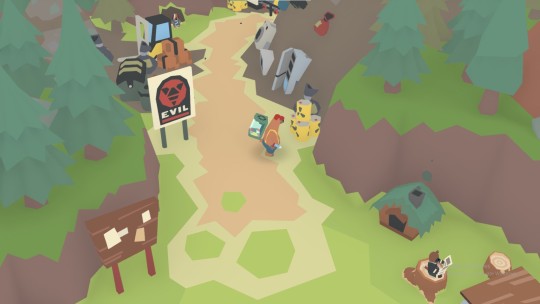
an ideologically baffling little environmental game free in the epic store this week, LumberJack. this is on PC and Switch for $13, which is far more money than the playtime anyone can get out of this game. tiny tiny tiny little Spain-headquartered studio without an active website, it looks like one guy hired out to make this and two more games and then went back to single-dev projects. i can respect that!
steam reviewers are mad at this game for being woke, and i'm mad at it for being woke in a very strange way. your one mechanic, as a bear, is swinging a big axe to remove cars and trailer offices and portapotties and various garbage from the landscape.
i wish the movement and look controls are inverted, and i wish they weren't, or at least had an option to make them normal. i know Why this isn't a mobile game (can't monetize something with twoish hours of gameplay and twenty levels) but it's a very straightforward and simple game that would translate very well to mobile. much like donut county.
now for being picky about the political mindset of the developers: as much fun as it is to be a bear swinging an axe around, lumberjacks are not the people i associate with wild preservation movements.

saving the land and turning it back into pristine and perfect land for wild animals in this game looks like erasing every hint of human activity from a site and turning it into sheer recreational use. many levels are heavily polluted, but some can definitely be read as recycling centers. im confused by the erasing every hint of humans in early levels, and then this level where you break down a radio station, slap the host with your axe, and she turns into a park ranger who starts gardening and taking care of chickens?


i don't think that removing all the traces of people from the landscape will magically fix everything, nor do i think simply being in unspoiled wilderness will magically fix me.

there's a golfing level where you whack bombs into various small buildings. i think golfing to save the environment is a strange choice to make for designing a game.

i also briefly thought this bird in every level was an extinct ivory-billed woodpecker, which was a little alarming bc there are some real nutjobs out there with very strong beliefs about this bird and government overreach and how much the government is lying to you about the extinctness of various animals.
i stopped playing about halfway through bc i was not having fun and found the underlying environmental message a little confused. they've managed to sell at least 10k units which is...not very good. i am not surprised this is free on epic, and i wonder what their payout for that was. would not be surprised if they negotiated a payment to their nonprofit partner ecologi as part of that.
-
making
yeehawgust fill! i have another bitchy blond babygirl!

what the fuck is the prisoner? cult 60s british spy tv. with all the surreality and anxieties about the cold war and midcentury psychological horror you could possibly want

He’d been drugged enough times to recognize the splitting migraine rapidly galloping down his neurons. “Where am I?” He fought down the taste of bile (ketamine? xylazine, by the aftertaste) and the rising panic. Oddly enough, the migraine was always worse with veterinary sedatives. One would think a mind would adapt to nearly three hundred years of irregular drugging and constant experiments. One’s body had adapted and ghoulified, but in equally unhelpful ways. The tycoon flickered, approximating an appraising blink. “This meeting has been a long time coming, hasn't it? You've come a long ways, literally and, I suspect, figuratively as well. You’re in the Free Economic Zone of New Vegas.” They’d pretended the prisons were so many different places: across the Continent, in various parts of London, up and down and all around the East Coast of these wretched States. Rarely this far west, aside from the awful escapade in the faux pre-War Western town. “What do you want?” He managed to swing his ankles off the saddle (also pre-War? Heavily used. It certainly wasn’t his, the equestrian event had always been his worst event in the pentathalon) and jolted what felt like every half-dead nerve in his half-dead body.
26 notes
·
View notes
Text
Threads, Meta's new social media app, has signed up 100 million new users less than a week since its launch last Wednesday, making it the fastest-growing app in history.
Like other social media apps, users probably barely scanned − or skipped − the terms and conditions for what information Threads can collect, share and sell about them.
Meta probably already had a lot of information about users because Threads is built upon its Instagram platform.
Start the day smarter. Get all the news you need in your inbox each morning.
So how much does Threads already know about you, and what can it do with that data? Here are a few reasons to be concerned about your privacy.
What information does Threads collect?
Social media platforms monetize user data by selling relevant ads based on your location and activity, but, along with the usual app privacy requests like browsing history and location data, Threads also asks for financial information, health and fitness data, diagnostics and a nefarious-sounding "sensitive info."
Many users have voiced concern over Threads for its 14-point list of data permissions you're granting Meta to use the app. Twitter, by comparison, has 10 of these.
"I would say it's at the outer boundaries of what's usually expected, which is to be expected from its connection to Facebook, a brand long known for being especially hungry to take in user data and commercialize it in different ways," says Dan Ackerman, the new editor-in-chief at Gizmodo, a leading technology, science and culture news publication.
Android users can toggle off some of the data requests from the app, while the Apple App Store is "more take-it-or-leave it," Ackerman said.
"It also doesn't help that there's no browser-based fully functional version of Threads right now, and so you have to use the app version," he said.
Meta declined my request for comment and clarification.
Is Threads data collection worse than Twitter?
It's not necessarily malicious, suggests Tim Bajarin, a veteran technology analyst and Chairman of the San Jose, California-based market research firm Creative Strategies. "Users should know this Threads data list is pulled directly from Instagram, and it's all tied to their advertising engine when they start to monetize Threads.
"When you sign off on financial info, for example, they're not looking at your bank statements or anything," Bajarin said.
Rather, Threads collects what you're posting about and liking, where you are, and whether you bought something through a third-party site, app or game you logged into using your connected Facebook/Instagram ID (usually to avoid creating a new password altogether).
Bajarin said users are granting Meta access for future advertising.
"Meta isn't giving you a free app out of the goodness of their heart − they're there to make money, which is mostly from advertising."
Threads can collect and save this information, and the data can also be shared with third-party services that connect to your Threads profile.
Can you deactivate Threads?
Yes, but you cannot delete it without also deleting Instagram, Bajarin said.
"Meta built (Threads) on the Instagram infrastructure, on top of the program itself, and so it would be very difficult to uninstall one and not both – at least the way it's engineered today. ... They could eventually be spun out to be completely separate apps," Bajarin said.
To deactivate (but not delete) your Threads account, Adam Mosseri − the Instagram boss who now spearheads the Threads app – says you can choose to hide your Threads profile and content, delete individual Threads posts and set your profile to private, as reported by USA TODAY contributor Jennifer Jolly.
"Threads is powered by Instagram, so right now it's just one account, but we're looking into a way to delete your Threads account separately,” he posted.
Ackerman said the fact Threads is built on Instagram is actually a boon for Meta and users, "as it's especially easy to sign up for, has no wait list, and is simple to use." But "in order to delete your Threads account after you sign up, you’ll need to delete your Instagram account, as well, which reminds me of the difficulty people had deleting their Facebook accounts in the past, and how there was a lot of fine print about what data Facebook would keep unless you jumped through extra hoops."
Is the Threads app safe?
Threads is asking for more permissions than Twitter, so it boils down to your comfort level.
Though some of the privacy permissions seem ludicrous – granting Threads access to health and activity data and other "sensitive info" on a smartphone just seems wrong – no one is forcing users to install and use Threads or any other social media app that monetizes its free platform by delivering personalized, contextual ads to you.
Threads is available in more than 100 countries, but perhaps it's no surprise it isn't available in the Europe Union just yet: Meta was forced to pay more than $400 million by EU regulators for forcing users to accept targeted ads.
Personally, I am using and enjoying Threads quite a bit but wish there was more clarity about how my data is collected and used. And I'm disappointed Meta declined to clarify things.
I select "Ask not to track" on all iPhone apps to reduce an app's visibility into my web browsing activity, and I have a virtual private network (VPN) on my computer for extra privacy, but perhaps it's true there is nothing truly free in this world – it's just up to each person to decide whether the cost is worth it.
24 notes
·
View notes
Text
I've been using Pokemon Sleep for about five weeks now. Here's some thoughts below the cut. It's a long one.
First, my opinions about the nuts and bolts of how it works. This is... mostly complaints.
- The monetization in this game is absolutely disgusting. Like just heinous. If you're the kind of person that needs to avoid stuff with microtransactions, do not install this game. I haven't given them a dime, but I've also at this point built up a strong resistance to monetization tricks. DO NOT let your kids play this game if they have a credit/debit card hooked up to their accounts.
- On the flip side, credit where due, when they say on the load screen that you can play 100% of the game without paying, this is true. You'll progress faster and with less effort if you pony up some cash, but the game gives you a decent stream of the premium currency, Diamonds, that will get you access to whatever niceties you'd like. If I wanted something that requires the premium currency to get, I haven't found myself walled behind a massive wait for the drip feed to catch up.
- The game wants roughly thirty minutes to an hour of your time a day not counting the sleep tracking. Three ten to twenty minute chunks. One in the morning to review last night's sleep data and feed Snorlax breakfast, one in the afternoon for lunch, and then one or two in the evening for dinner and switching on the sleep tracking.
- When the app tells you to put your phone on the bed for the sleep tracking, this is actually NECESSARY for how it functions. I had assumed it just uses audio to gauge if you snore or whatever (which it does), but it also uses your phone's accelerometer to determine if you're tossing and turning and by extension how deep you're sleeping. If you put it on a bedside table or something, it'll give you a readout saying you slept like an absolute fucking ROCK. If you're like me and toss and turn a lot, you can actually use this to cheese the game a little since certain Pokemon only appear when you sleep deeper and those are for me quite hard to get without this cheese. I would go so far as to actively recommend this tactic.
- You may notice that's kind of a creepy amount of data to collect and it feels kind of like inviting a stalker into your bedroom. You are correct. The app assures you that the actual sleep data does NOT get transmitted at all. I do not have anything other than their word to confirm that. I don't know if what it collects is fairly standard for other apps like it, but my assumption is yes?
- Because of how it tracks your sleep info, if you sleep with a partner in the same bed it completely skullfucks its tracking.
- If you have an even slightly older phone, the app chugs whenever you try to click anything. There's like a one-second lag on every click in the menu followed by a short load screen. Those 10-20 minute sessions would be about half as long if I had a phone with more processing speed.
Now all the above might sound damning as hell. But here's the thing. I like this app a lot actually. It's DEEPLY flawed, but let's talk about the game's mechanics, which is mostly positives:
- Right at the top, this app has improved my sleep schedule, pardon the pun, practically overnight. My new PC has told me twice now that step one to fixing most of my mental health issues is healthier sleep, which he knows is hard but you gotta try. I've been hesitant to take the meds he prescribed for that, but I heard about this app and figured gamifying sleeping on time would be a great way to get me to actually do it. Worked like a charm. The game asks what you'd like your nightly bedtime to be, and gives you rewards for maintaining it. You get these rewards if you go to sleep either 90 minutes prior to that time, or 30 minutes after. My doctor recommended 30 in each direction for consistency, but they don't send you a reminder notification until that 30 minute mark prior so partial credit I guess? I've missed that bedtime like 3 times in these last five weeks, and yeah my everything is way better.
- Looking at the Pokemon wandering my camp makes my brain make the happy juice in a way most Pokemon stuff really doesn't anymore. Like, there's no battles or anything (although you apparently can transfer to and from Pokemon Go, don't know how well that works because I don't play), so you just get a pleasant kind of domesticity most Pokemon stuff doesn't do.
- Here's the actual gameplay loop. You're researching Pokemon sleep patterns. To do this, you're using some nonsense machine that amplifies local Snorlax's natural aura of sleepiness to attract Pokemon to come sleep by it. Snorlax's are apparently the capybaras of the Pokeworld which I actually love. The more you feed Snorlax, the more powerful this sleepy aura becomes. It resets each week because you go to a new campsite with a new Snorlax. During the day, your team of Pokemon (max of... 5 for some reason instead of the default six everywhere else in this franchise?) gather berries to feed your Snorlax throughout the day in idle-game-esque timers, as well as ingredients for more complicated meals. You take the ingredients, make Snorlax meals up to three times a day (6am-noon for breakfast, noon-6pm for lunch, 6pm-6am for dinner). Each pokemon also has an ability that in some way helps you out. Then you can at any time turn on the sleep tracking, then turn it off when you wake up. After a rest of 90+ minutes has been tracked, it gives you a total of how much power that rest generated, and takes you to a minigame where you photograph the sleeping Pokemon that came to rest in your camp. The more power, the more varied the sleeping positions and the rarer the Pokemon. You can then feed them biscuits to befriend them. You get the equivalent of a Great Ball(/Biscuit) every day which on its own fills about 3/5 of a non-evolved Pokemon's friendship bar (the basic biscuit that you'll use most of the time fills 1/5), so there's always at least some progress towards making a friend. Sometimes a Pokemon is extra hungry and the first thing you feed them is worth triple, and you can also get that same multiplier as an RNG thing without warning. Once you fill up a bar, you've befriended that Pokemon and can now add it to your teams or send it to the professor for candies like you do in Pokemon Go. You are also given candies for every Pokemon you attracted even if you don't befriend them, plus "Sleep Points" based on how long you slept for that can be exchanged for items like more biscuits (for reference, a single basic biscuit is roughly 1.5 times a good night's sleep... fucking YIKES) plus "Dream Shards" for how cool the photos you took are, which are used mostly for leveling up your Pokemon and upgrading your camp.
- I love this gameplay loop actually. It feels way more like these Pokemon are my friends as opposed to wild animals I've caught.
- Leveling up and evolving take large amounts of those candies and dream shards. The candies feel like the primary gate on progression.
Overall, this is a game I like a lot despite its flaws, and the positive impact it's had on my health even in this short span is hard to understate. I wish they'd back off with the creepy monetization so I could actively recommend instead of recommend with an asterisk. But yeah that's my thoughts on this weird ass product.
12 notes
·
View notes
Text
‘Is blogging still relevant in the age of TikTok and Instagram?’
What is a blog? I believe that most of the youngsters now do not know what it is. The word blog is a combined version of the words “web” and ‘log” (Weiner 2023). A blog is like an online diary or online journal, following a blog is like getting to know someone or watching their life just like watching a television series. There are many types of blogs, like food blogs, travel blogs, lifestyles blogs, health and fitness blogs, sports blogs, fashion and beauty blogs, and others.
Back to our topic, is blogging still relevant in the age of TikTok and Instagram? I would say yes, blogging is still relevant in the age of TikTok and Instagram. Granted that most people now are using TikTok and Instagram, but according to the research (van Dijck 2013) every single day, millions of individuals interact through social media. In December 2011, 1.2 billion users worldwide, 82 percent of the world’s Internet population over age 15 logged on to a social media site, up from 6 percent in 2007 (van Dijck 2013).
Nowadays, many people still use blogs, not only self-publishers, journalists, writers, marketers, and businesspeople also using blogs. Blogs are a powerful tool for Search Engine Optimisation (SEO). Businesses can post blogs with some keywords to help them grow the flow.

The length of the content we write is one of the most important SEO variables in 2020 for ranking highly. According to Rioja (2020), if we write a blog article that we want to rank, we need to make sure we are going into as much detail as possible. If we did not write at least 1500–2000 words per post, we would not rank. The ability to post long-form content is a benefit of blogging in this situation. The Instagram caption length restriction is 2200 characters, which is roughly 338 to 440 words. Instagram posts short-form information as compared to blogging, thus we are limited in how detailed we can make our captions. Because of the word limit of social media, users do not have enough space to introduce themselves in detail, whereas in blogs, users can present themselves more comprehensively. Therefore, blogs remain an indispensable platform.
The fact that blogging is still important in the era of TikToks and Instagram is also due to the wide range of content. Text, photos, videos, graphics interchange formats, and other types of media can all be included in blogs. We are limited to choosing between posting pictures or videos on Instagram and TikTok, though. Furthermore, we are only allowed to upload ten images in each Instagram post, and videos can only be one minute in duration. We may upload the video as a reel if it lasts longer than one minute, however, only one video can be posted for each reel post. Blogging also can be a digital diary. As we mentioned before, because of the word limit, we cannot express our emotions. In the age of TikToks and Instagram, many people use blogs to record their lives, just like a diary. Furthermore, there are many ways to earn money from our blogs. Some of the most popular ways to monetise include offering content by subscription, display advertisement, affiliate marketing, sponsorship, online courses, and eBooks (Shwake 2023). These monetised ways are quite easy compared to earning money on Instagram and TikToks. Instagrammers and TikTokers earn money in a few ways such as setting up an online shop, partnerships with other businesses, or live streaming. For me, we can earn money from blogs in a cosy and freedom style, as many people also earn money from their blogs, plogs, and vlogs. Instead of using Instagram or TikTok, most of them still choose to blog because it offers multiple monetisation avenues.
Lastly, despite TikTok and Instagram, blogging is still relevant today. Blogging is still vital even if many new social media platforms have grown up and may even be trying to mimic blogs. Additionally, a lot of people say that blogs are the ideal medium for expressing our emotions and making money. Also, I believe the blog is a great place for kids to improve themselves, as there is a lot of unhealthy content on TikTok and Instagram. I would not say there is not any toxic stuff on blogs, but as of right now, I have not seen any.
youtube
List of References
Jill Walker Rettberg 2013, Blogging, 2nd Edition., John Wiley & Sons, viewed 1 October 2023 <https://swinburnesarawak.instructure.com/courses/839/files/73195/download?verifier=7BsJ2Kl9b5O6ujtXzoGnueJ327TJYLfniNv80uSO&wrap=1>. Rioja, A 2020, What is SEO? Learn the Basics of Search Engine Optimization [2020], alejandrorioja.com, viewed 29 September 2023, <https://alejandrorioja.com/what-is-seo/>. Shwake, E 2023, How To Monetize a Blog in 2023 in 7 Effective Steps, Wix Blog, viewed 30 September 2023, <https://www.wix.com/blog/how-to-monetize-blog#:~:text=There%20are%20many%20ways%20to>. van Dijck, J 2013, Engineering Sociality in a Culture of Connectivity, Oxford University Press, New York, viewed 29 September 2023, <https://research.ebsco.com/linkprocessor/plink?id=457be821-4029-3b2e-87da-72784dc1f978>. Weiner, A 2023, What is a blog? Definition, types, benefits and why you need one, Wix Blog, viewed 1 October 2023, <https://www.wix.com/blog/what-is-a-blog>.
12 notes
·
View notes
Text
Week 3: Social Media Blog
The impact of big data and algorithms cannot be overemphasized. The speed of technology changing the way we live, work, and connect with others has changed tremendously. After watching the lecture and the Netflix documentary "The Social Dilemma," have shown how important it is to reflect on the tools and potential dangers they pose. The blog will talk about the reasons why big data and algorithms are powerful and their associated risks. Then, I will talk about the different strategies to address these issues more on a personal and professional level. The Power of Big Data and Algorithms have so much control over humans that we haven't even begun to recognize how much it affects each one of us daily. With them having the ability to identify patterns and making predictions helps them keep control.
“The Social Dilemma” said that many social networks exploit human weakness by designing a positive intermittent reinforcement in mind. This makes humans stay connected to their phones and are sitting there scrolling for hours on end. Data-Driven Decision-Making: Businesses, governments, and organizations are using big data and algorithms to make informed decisions. These tools help them see consumer behavior and market trends, while also helping to predict disease outbreaks. Then with Personalization Algorithms make sure to put highly tailored content and advertisements you encounter online. This is all done by watching your preferences and behaviors, aiming to increase engagement. They check people's scale and speed in real-time. Like for the Tesla car and others we have efficient and automated vehicles that are self-driving cars and other things that humans no longer must do for themselves.
The Dangers of Their Use and Abuse
The algorithm didn’t see how much it affected the people's mental health and well-being. The addictive nature of social media platforms has pushed a lot of individuals over the top and feel they can’t go a day without having it. The documentary "The Social Dilemma" talked about how user data is harvested and monetized by social media platforms, potentially undermining individuals' privacy. Big data algorithms can be weaponized to spread misinformation.Algorithms can exacerbate societal biases, leading to discrimination in various aspects. If we educate ourselves more about data privacy and digital literacy. This will help us protect our personal information. Cutting down and limiting your screen time will help you.
In my view, dealing with these problems requires a multi-faceted approach. On a personal level, individuals need to be more aware of their digital footprint and take steps to protect their data. This could include using privacy tools, limiting time spent on social media, and being critical of the information they consume online. On a professional level, tech companies need to prioritize ethical considerations in their use of big data and algorithms. This could involve implementing stricter data protection measures, being transparent about their data practices, and designing products that promote user well-being. On a societal level, there needs to be stronger regulation of tech companies and their use of data. This could include laws that protect user privacy, prevent data misuse, and promote competition.
The influence of Internet business models on information privacy is profound. The prevalent 'free' model, where services are provided in exchange for user data, has led to widespread data collection and a lack of privacy. Users often unknowingly trade their personal information for access to these services, which is then used to generate revenue through targeted advertising. This model has been criticized for its lack of transparency and the potential for abuse.
3 notes
·
View notes
Text
Week 3: Social Media, Privacy, & Internet Business Model
Welcome back readers!
In our increasingly digitalized world, the impact of big data and algorithms cannot be overstated. The rapid growth of technology has transformed the way we live, work, and connect with others. After watching the lecture and the Netflix documentary "The Social Dilemma," it's important to reflect on the immense power exerted by these tools and the potential dangers they pose. In this blog post, I will explore the reasons why big data and algorithms are powerful and delve into the associated risks. Additionally, I will discuss strategies to address these issues on personal, professional, and societal levels.
The Power of Big Data and Algorithms
Big data and algorithms have become formidable tools due to their capacity to process and analyze vast amounts of information efficiently. Their strength lies in their ability to identify patterns, make predictions, and optimize outcomes. Here's why they are so powerful:
Data-Driven Decision Making: Businesses, governments, and organizations use big data and algorithms to make informed decisions. These tools can analyze consumer behavior, market trends, and even predict disease outbreaks, leading to more effective planning and resource allocation.
Personalization: Algorithms are responsible for the highly tailored content and advertisements you encounter online. They analyze your preferences and behaviors, aiming to enhance user experience and increase engagement.
Efficiency and Automation: Automation, driven by algorithms, has improved productivity in various sectors. This includes self-driving cars, recommendation engines, and smart manufacturing.
Scale and Speed: Big data and algorithms can process information at an unprecedented scale and speed, offering insights and solutions in real-time.
The Dangers of Their Use and Abuse
Privacy Invasion: The collection of vast amounts of personal data raises concerns about privacy. The documentary "The Social Dilemma" shed light on how user data is harvested and monetized by social media platforms, potentially undermining individuals' privacy.
Filter Bubbles and Echo Chambers: Algorithms that prioritize personalized content can trap individuals in filter bubbles, reinforcing their existing beliefs and limiting exposure to diverse perspectives.
Manipulation and Misinformation: Big data and algorithms can be weaponized to spread misinformation and propaganda.
Bias and Discrimination: Algorithms can perpetuate and even exacerbate societal biases, leading to discrimination in various aspects.
Addiction and Mental Health Concerns: The addictive nature of social media platforms, driven by algorithmic recommendations, has raised concerns about their impact on mental health and well-being.
Addressing the Issues
1. Personal Level:
Educate yourself about data privacy and digital literacy to protect your personal information.
Limit your screen time and be mindful of your online consumption.
Diversify your information sources to break free from filter bubbles.
2. Professional Level:
Emphasize ethical AI and data use in the workplace. Develop guidelines and policies that promote fairness, transparency, and accountability.
Invest in employee training to ensure awareness and responsible use of data and algorithms.
3. Societal Level:
Advocate for stricter regulations and policies governing data collection and algorithm use.
Hold tech companies accountable for ethical practices and demand transparency in their algorithms.
Promote digital literacy in schools and communities to empower individuals to navigate the digital landscape effectively.
In conclusion, big data and algorithms are undoubtedly powerful tools with the potential to revolutionize industries and improve our lives. However, they also pose significant dangers when misused or abused. To strike a balance, we must address these challenges on personal, professional, and societal levels to ensure that the digital age benefits all of humanity without violating fundamental rights and values. It's a journey that requires collective efforts and continuous observation.
Until next time,
Brianna W.
4 notes
·
View notes
Text
Mastering the Amazon Affiliate Game: 4 Years of Expertise
Introduction: Becoming a successful Amazon affiliate shop is no small feat. With four years of experience under your belt, you've likely navigated the ever-changing landscape of online retail, honing your skills to earn commissions as an affiliate marketer. In this article, we'll delve into some key strategies and insights gained from four years of hands-on experience in the Amazon affiliate program.

Niche Selection: One of the foundational elements of affiliate success is selecting the right niche. Your four years of experience have taught you that niches with passionate audiences, such as health and wellness, technology, or hobbies, can be lucrative. But more importantly, you've learned that you should choose a niche you're genuinely interested in. Your passion will shine through in your content, making it more engaging and authentic.
Quality Content: Content is king in the world of affiliate marketing. Over the years, you've likely realized that creating high-quality, informative, and engaging content is non-negotiable. Whether it's in the form of blog posts, product reviews, or videos, your content should be valuable to your audience and help them make informed purchasing decisions.
SEO and Keyword Research: Understanding the basics of search engine optimization (SEO) is crucial. Your four years of experience have likely taught you the importance of keyword research, on-page optimization, and building backlinks to boost your site's visibility on search engines. Keeping up with SEO trends and adapting to algorithm changes is essential for long-term success.
Diversification: Amazon's affiliate program has seen changes over the years, including commission rate adjustments. Diversifying your income streams by partnering with other affiliate programs or monetizing your site through other means, like sponsored content or selling digital products, can help mitigate the impact of these changes.
Data Analysis: Data-driven decision-making is a key component of successful affiliate marketing. You've likely become adept at using analytics tools to monitor traffic, conversions, and sales. Regularly analyzing this data allows you to refine your strategies, optimize your content, and adapt to changing market conditions.
Conclusion: Four years in the Amazon affiliate program is a significant milestone, and it's clear that you've gained valuable insights and expertise along the way. Your ability to select the right niche, create quality content, master SEO, diversify income streams, and analyze data sets you on a path to continued success. As you continue to adapt and grow, your journey as an Amazon affiliate shop is bound to be even more fruitful in the years to come.
2 notes
·
View notes
Text
How to Turn Your Online Business Dreams into Reality


Introduction: The Digital Frontier of Entrepreneurship Selecting a Niche and Business Model: The Foundation of Success Building Your Online Platform and Brand: Your Digital Headquarters Creating High-Demand Products and Services: Delivering Value to Your Audience Implementing Effective Marketing Strategies: Attracting Targeted Traffic Diversifying Revenue Streams for Maximum Profits: Building Financial Stability Optimizing for Maximum Profitability Long-Term: Building a Sustainable Business Conclusion: Turning Dreams into Reality True successful story
Introduction: The Digital Frontier of Entrepreneurship
In today's digital age, the rise of the internet and technology has revolutionized the way we do business. It has opened a world of opportunities for entrepreneurs to start and run their own businesses online. Online businesses offer flexibility, scalability, and the potential for global reach. This comprehensive guide will provide you with a step-by-step framework for building a profitable online business from the ground up. Whether you want to start a side business or build a full-time online empire, follow this ultimate guide to turn your idea into a thriving, sustainable online business. With focus, grit, and commitment to continuous improvement, you can build the profitable online business of your dreams.
Selecting a Niche and Business Model: The Foundation of Success
The foundation of every successful online business is choosing a profitable, in-demand niche and a business model tailored to your goals. Select a niche you're passionate about; this will make creating content a breeze. Conduct thorough keyword research to assess search volume and demand. Join relevant online communities to connect with your audience and understand their needs. Evaluate direct competitors in the niche and aim for less saturated niches or unique angles. Consider affiliate marketing potential, as some niches offer higher commissions. Assess opportunities to create multiple products and monetize in diverse ways. Examples of popular online business niches include health, fitness, personal finance, pet care, tech, travel, content marketing, home design, spirituality, language learning, and more. Choose a business model that complements your niche and provides multiple income stream opportunities. Many successful online businesses incorporate 3-4 monetization models. Some of the best online business models to consider include: 1. Blogging: Make money with display ads, affiliates, and branded products. 2. Online Courses: Sell your knowledge and expertise as courses. 3. Dropshipping: Curate and sell products without inventory. 4. Affiliate Marketing: Earn commissions promoting other companies' products. 5. Information Products: Sell online books, templates, checklists, and more. 6. Virtual Services: Provide consulting, freelancing, coaching, or other services. 7. Subscription Membership Site: Offer exclusive content or tools for a monthly fee. 8. E-commerce Store: Sell physical products, merchandising, and more. Your choice should complement your niche and offer multiple income streams. Many successful online businesses incorporate 3-4 monetization models.
Building Your Online Platform and Brand: Your Digital Headquarters
Your website or blog will serve as the headquarters for your online business. Invest time upfront in creating an optimized, professional-looking platform. Purchase a domain name that matches your brand, ideally a .com if available. Select reliable web hosting with optimal speed and uptime. Install WordPress or ecommerce platforms like Shopify or WooCommerce. Design an on-brand, mobile-responsive theme that conveys your style. Include essential pages like Home, About, Contact, Services, Blog, and Shop. Set up email marketing and analytics to capture leads and track traffic data. Create visually branded assets such as logos, color palettes, fonts, and graphics. Ensure a cohesive user experience across all touchpoints. If you lack web development skills, consider hiring a freelance designer to bring your vision to life. Continually optimize your website for higher traffic, leads, and sales over time. This includes technical enhancements, user experience improvements, and page speed optimizations.
Creating High-Demand Products and Services: Delivering Value to Your Audience
The key to running a profitable online business is consistently creating products and services that deliver extreme value to your audience. Popular digital products you can create include online courses, eBooks, guides, checklists, software, premium memberships, virtual events, video tutorials, templates, and more. When brainstorming products, look for opportunities to simplify lives, save time, educate, entertain, or improve outcomes for your target customers. Leverage your expertise and tap into the skills of others to create premium offerings. High-value services like consulting, freelancing, coaching, and more can also be extremely lucrative. Promote your services through your website and social platforms. Structure your offerings to passively earn income over time, such as online courses that continually generate sales vs. 1-on-1 services that require ongoing effort. Deliver an excellent user experience across your products and relentlessly optimize based on feedback to foster raving fans who refer others.

Implementing Effective Marketing Strategies: Attracting Targeted Traffic
Once your online platform and offerings are ready, it's time to start attracting targeted traffic using proven marketing tactics. A diverse marketing mix is key. Some of the top strategies include: 1. Content Marketing: Create engaging blog posts, videos, and visual content. 2. SEO: Optimize your website for search engines through on-page optimization and link-building. 3. PPC Ads: Utilize platforms like Google, Facebook, Instagram, and YouTube for pay-per-click advertising. 4. Email Marketing: Build your email list with lead magnets, newsletters, and automation. 5. Social Media Marketing: Employ organic and paid tactics to engage your audience. 6. Affiliate Marketing: Recruit others to promote your products and earn commissions. 7. Influencer Partnerships: Collaborate with relevant influencers in your niche. 8. Live Events: Host local meetups or virtual events to connect with your audience. 9. Podcast Guest Appearances: Grow your authority and reach new audiences. 10. Retargeting Ads: Remarket to previous site visitors across the web. Start by focusing on 1-3 core channels, then expand your efforts over time. Pay-per-click and social ads can help quickly scale an audience, while SEO and content creation tend to be most cost-effective in the long-term. Leverage tools like Google Analytics, Facebook Business Suite, and landing page builders to optimize results across all campaigns. Don't hesitate to enlist help from digital marketing agencies and specialists.
Diversifying Revenue Streams for Maximum Profits: Building Financial Stability
Generating multiple streams of revenue is key for building a highly profitable online business. Diversification reduces risk and provides stability as each income channel goes through ups and downs. Here are some of the most lucrative online business revenue models: 1. Product/Service Sales: Your core monetization stream. Ensure competitive yet profitable pricing. 2. Advertising: Display ads, sponsorships, native advertising, etc. Set up Google Ad Manager. 3. Affiliate Marketing: Promote other company's products for commissions. Join affiliate networks. 4. Memberships/Subscriptions: Offer exclusive benefits, content, or tools for a monthly fee. 5. Events: Sell tickets for online or in-person events and training programs. 6. Dropshipping: Curate and sell products without holding inventory. 7. Physical Merchandise: Sell branded products with print-on-demand services. 8. Consulting/Freelancing: Sell your skills and expertise through 1-on-1 services. 9. Tip Jars/Donations: Allow fans to tip or donate to show support. Aim to generate income from both active efforts like service packages and passive streams like online courses that earn as you sleep. Automate processes wherever possible to scale income without increasing workload proportionally. Reinvest profits back into growing your business and diversifying income channels to create an unstoppable snowball effect over time.

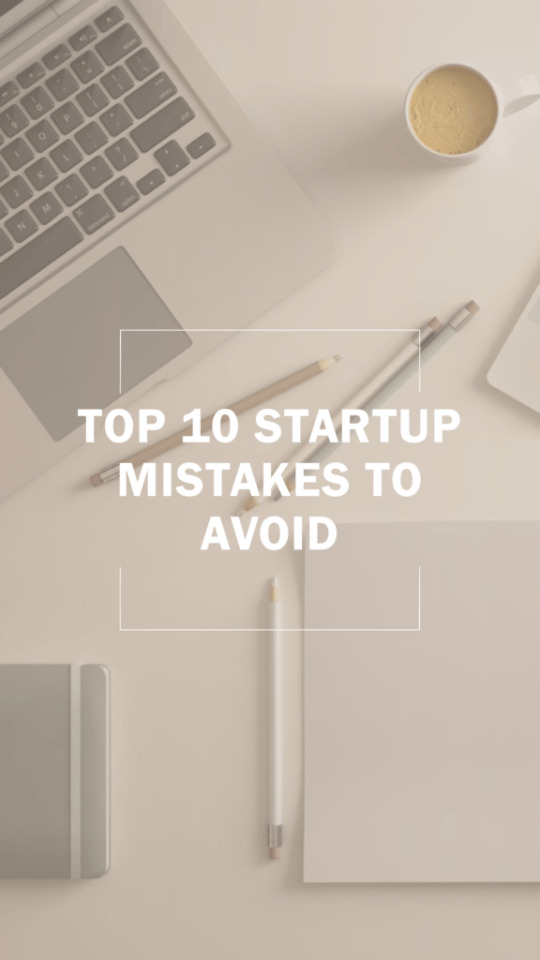

Optimizing for Maximum Profitability Long-Term: Building a Sustainable Business
Launching a profitable online business is an important first step. However, creating systems and processes that enable high profitability long-term is vital for sustaining growth. Here are some best practices for optimizing operations and profitability: - Obsessively track KPIs and metrics for all marketing channels and funnels. Analyze data to optimize underperforming areas. - Create excellent customer support systems. Provide prompt, personalized support to increase satisfaction and referrals. - Automate repetitive tasks wherever possible with tools like Zapier. Automate lead collection, customer onboarding, analytics, inventory management, etc. - Systematize your product creation process to quickly test and validate new product ideas, then scale those that resonate. - Document your systems and processes so future hires can replicate them. This includes SOPs for customer service, product fulfillment, etc. - Build a skilled team over time by hiring virtual assistants, freelancers, agencies, and eventually full-time employees. Focus on higher-level strategy. - Maintain work-life balance as a long-term entrepreneur. Make time for adequate rest, leisure, and self-care to avoid burnout. By staying agile, embracing innovation, and relentlessly providing value to your audience, you can build an online business that delivers meaningful income for decades to come.

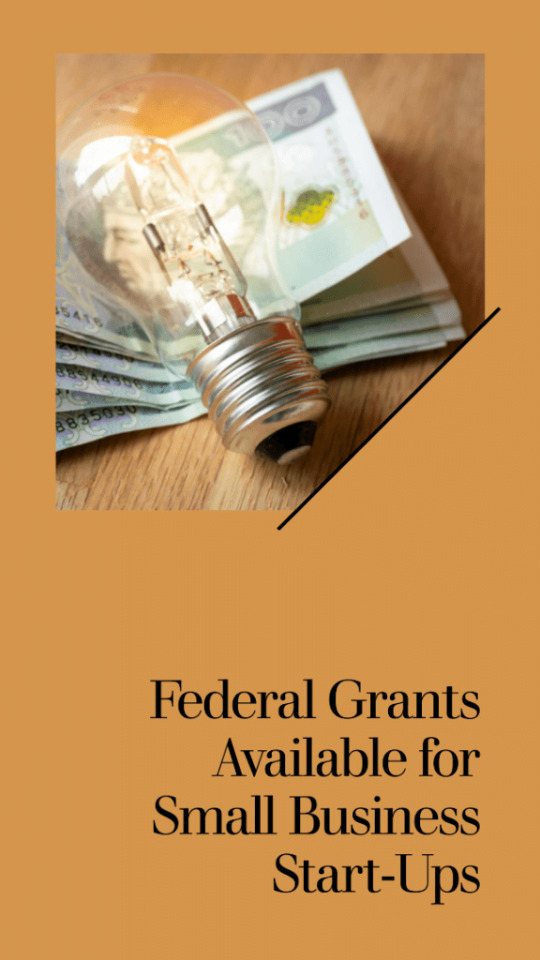

Conclusion: Turning Dreams into Reality
Starting and running a profitable online business takes consistent effort and persistence. However, by zeroing in on a niche, selecting the right model, crafting high-value offerings, implementing diverse marketing strategies, diversifying your revenue streams, and optimizing for maximum efficiency, you can build an online business that provides freedom and fulfillment for years to come. Remember to stay obsessively focused on understanding and serving your target audience. Combine your passion with grit, resilience, and creativity. With the right mindset and business foundations in place, you have immense potential to build a thriving online business that stands out and makes a lasting impact. The time to stop dreaming and start taking action is now. Follow this comprehensive guide to turn your online business idea into reality, step-by-step. You can build an online empire that allows you to live life on your terms. The possibilities are truly endless if you commit to continuous learning and improvement. Let this guide spark the fire within and set you on the path to online business success. Start pursuing your online entrepreneur dream today.


True successful story
To illustrate the principles and strategies discussed in this comprehensive guide, let's delve into the inspiring true story of Pat Flynn and his online business, Smart Passive Income. Smart Passive Income - About Pat Flynn Background: Pat Flynn was once an aspiring architect who unexpectedly found himself laid off during the economic downturn in 2008. Faced with uncertainty, he turned to the online world to seek alternative income sources. His journey began with a blog, which he aptly named Smart Passive Income (SPI). Selecting a Niche and Business Model: Pat recognized that there was a significant demand for information about creating online businesses and generating passive income. He was passionate about sharing his experiences, both successes and failures, and helping others navigate the world of online entrepreneurship. Pat's chosen niche was personal finance, but his business model extended beyond blogging. Building Your Online Platform and Brand: Pat invested in creating a professional-looking platform for SPI. He purchased a domain name, set up reliable web hosting, and designed an appealing website. His commitment to providing value was evident through the content he produced on his blog, podcast, and YouTube channel. His brand, Smart Passive Income, became synonymous with transparency, authenticity, and actionable advice. Creating High-Demand Products and Services: One of Pat's significant successes came from his creation of online courses and informational products. He developed courses on topics like email marketing, affiliate marketing, and podcasting, leveraging his expertise and audience trust. These products delivered immense value to his audience and contributed significantly to his income. Implementing Effective Marketing Strategies: Pat's marketing strategy was built on content marketing, podcasting, and email marketing. He consistently produced high-quality blog posts and podcasts, which not only attracted a dedicated audience but also positioned him as an industry expert. His email list grew as he offered valuable lead magnets and nurtured his subscribers. Diversifying Revenue Streams for Maximum Profits: Pat's income streams diversified over time. In addition to course sales, he earned from affiliate marketing, book sales, and speaking engagements. He also ventured into software development, creating tools like the Smart Podcast Player. This diversification provided stability and mitigated risk. Optimizing for Maximum Profitability Long-Term: Pat was relentless in optimizing his operations. He regularly analyzed data and user feedback to improve his products and content. His team expanded as the business grew, allowing him to focus on strategic decision-making. Pat prioritized work-life balance, emphasizing family and well-being. Conclusion: Pat Flynn's journey from unexpected job loss to the creation of a successful online business, Smart Passive Income, serves as an inspiring real-life example of the principles discussed in this guide. His dedication to providing value, commitment to continuous improvement, and willingness to diversify income streams are key takeaways for anyone aspiring to build a thriving online business. Pat's story reminds us that with the right mindset and a clear vision, online entrepreneurship can lead to a fulfilling and prosperous career.


Read the full article
#business-model#guide#marketing#niche#online-business#products#profitability#revenue#services#Success
5 notes
·
View notes
Text
How to Earn Online Money In the USA
There are various ways to earn money online in the USA. Keep in mind that like any other form of income, online earning requires effort, time, and sometimes initial investment. Here are some legitimate methods to make money online:
Freelancing: Offer your skills and services on freelance platforms like Upwork, Fiverr, Freelancer, or Toptal. Depending on your expertise, you can find opportunities in writing, graphic design, web development, digital marketing, and more.
Online Surveys and Market Research: Participate in paid surveys and market research studies on websites like Swagbucks, Survey Junkie, and Vindale Research. While this won't make you rich, it's an easy way to earn some extra cash.
Content Creation: If you have a passion for creating content, you can start a blog, YouTube channel, or podcast. Once you gain an audience, you can monetize through ads, sponsorships, and affiliate marketing.
Online Teaching: If you have expertise in a subject or skill, consider teaching online. Platforms like VIPKid and Teachable allow you to create and sell courses to students worldwide.
Selling Products: Start an online store using platforms like Shopify or Etsy to sell physical or digital products. You can also leverage Amazon's FBA (Fulfillment by Amazon) to sell products without the hassle of shipping and handling.
Stock Photography: If you're a photographer, you can sell your photos on stock photography websites like Shutterstock or Adobe Stock.
Virtual Assistant: Offer virtual assistant services to businesses and entrepreneurs. Tasks may include managing emails, scheduling, data entry, and more.
Affiliate Marketing: Promote products or services through affiliate links, and earn a commission for every sale made through your unique referral link.
Online Investing: Consider investing in stocks, cryptocurrencies, or peer-to-peer lending platforms, but always remember that investing involves risk.
Online Gaming and Streaming: If you're skilled in gaming, you can earn money through live streaming on platforms like Twitch, YouTube Gaming, or Facebook Gaming. Additionally, some games offer opportunities to earn money through in-game items and currencies.
Dropshipping: Start an e-commerce business without holding any inventory. With dropshipping, you sell products to customers, and the supplier ships the products directly to them. Platforms like Shopify and WooCommerce can help you set up your online store.
Remote Work: Many companies offer remote job opportunities. Websites like Remote.co and FlexJobs list remote positions across various industries.
Transcription Services: If you have good typing skills, consider providing transcription services to convert audio or video content into text. Websites like Rev and TranscribeMe offer such opportunities.
Online Consulting: If you have expertise in a particular field (e.g., business, finance, marketing, health), offer consulting services online via video calls or email.
Rent Out Your Space: If you have extra space, you can rent it out through platforms like Airbnb for short-term rentals or use Peerspace for events and meetings.
Online Surplus Sales: Sell items you no longer need on online marketplaces like eBay, Facebook Marketplace, or Craigslist.
Language Tutoring: If you are fluent in multiple languages, offer language tutoring or translation services through websites like italki or Verbling.
Remote Programming: If you're a programmer or software developer, you can find remote coding projects on platforms like GitHub, GitLab, and Stack Overflow Jobs.
Online Data Entry: Some companies offer data entry tasks that can be completed remotely. Look for opportunities on job boards or freelancing platforms.
Social Media Management: Help businesses manage their social media presence and create content for platforms like Instagram, Facebook, Twitter, etc.
Create and Sell Printables: If you have design skills, create printable templates or digital products like planners, calendars, and artwork to sell on platforms like Etsy or your website.
Online Gaming Tournaments: If you're a skilled gamer, participate in online gaming tournaments that offer cash prizes.
Remote Customer Service: Some companies hire remote customer service representatives to handle customer inquiries via phone, chat, or email.
Virtual Events and Webinars: Host virtual events or webinars on topics of interest and charge attendees for access.
Remember that success in online ventures often requires consistency, dedication, and adaptability. It may take time to build a sustainable income stream, so be patient and keep learning and improving your skills. Always be cautious of scams and never invest money you can't afford to lose in any online opportunity.
#earnings#money#earnmoney#earning#earn#business#earnonline#workfromhome#earnmoneyonline#makemoney#affiliatemarketing#forex#investing#investment#onlineearning#entrepreneur#earnfromhome#makemoneyonline#stockmarket#onlinebusiness#bitcoin#motivation#earningmoney#stocks#success#makemoneyfast#digitalmarketing#india#paytm#moneymaker
3 notes
·
View notes
Text
Creating a Mental Health App in 2024
Features, Costs and Monetization
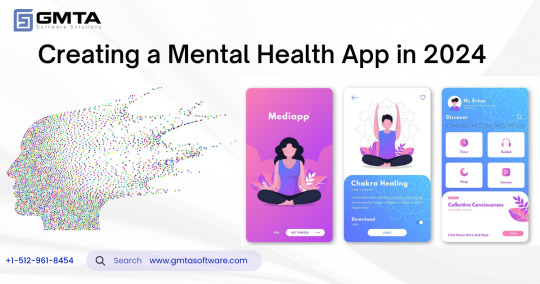
Uncertainty caused by the COVID-19 epidemic and its aftermath is contributing to a worsening mental health crisis. But so are applications that help individuals manage their mental health, and they’re becoming increasingly popular and lucrative.
Statista predicted that between 2020 and 2022, the market for mobile Mental Health App would expand by 82.5%, amounting to 491 million USD in sales.
Create a platform that helps many people find inner calm and contentment by developing an app for mental wellness.
This article discusses the definition, possible benefits, and construction of Mental Health App. As a bonus, it walks you through each step.
Start right now!
What exactly are mental health apps?
Apps designed specifically for keeping tabs on your mental health are known as “Mental Health App.”
From apps aimed at those with specific illnesses and disorders to those that offer generalized help, the mental health business is incredibly varied.
How To Develop a Mental Health App- Nice To Have Essential Features
You now know the most important metrics to track when you design your mental health app. Let’s move right along to the things that make a difference in performance and customer satisfaction. When it comes to on demand Mobile App Development, the best Mobile App Development Companies will always provide you with the following:
The Most Important Features of a Mental Health App:
User Registration

Collect necessary information, including name, contact details, and email, in a safe and simple sign-up process for health apps.
User Profiles

Users can add information about themselves in mental health apps, such as their medical history, allergies, chronic conditions, age, gender, and even images.
Notifications and Reminders

While taking care not to overwhelm users, schedule notifications and reminders like relaxation sessions, journal entries, and medication in the best mental health apps.
Sharing
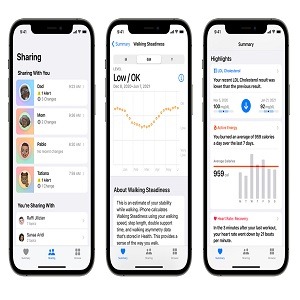
Allow individuals to broadcast their emotional state and the progress they’ve made in therapy to their loved ones, friends, healthcare practitioners, and online support groups.
Support Communities

Create a sense of belonging by facilitating user-to-user conversation in safe, anonymous settings like forums, chats, and other similar bonds in your Mental Health App.
Patient-Therapist Connection

Use algorithms to match users’ requirements with the proper therapists and help them get in touch with each other.
Therapy Dashboard for Doctors

Provide therapists with a dashboard on the web where they can manage patient data, collect statistics, and keep track of their patients’ development.
Reminders for Patients
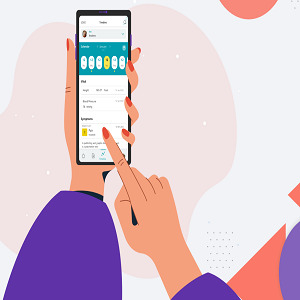
Help people keep up with their treatment plans by setting up drug reminders.
Secure Messengers and Chats

Whether using text, audio, video, or live chats, the best therapy apps should provide a safe space for patients and therapists to talk.
Relaxation Exercises

Include simple games, meditation, yoga, breathing exercises, and other relaxation methods to assist in unwinding, unsharpening, and sharpening their minds.
Gamification
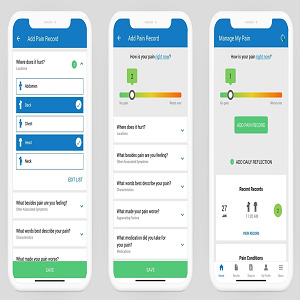
To make mental health care more interesting and fun, designers can implement interactive games with upbeat and soothing aesthetics.
Emergency Support

Make it possible for people experiencing anxiety or panic attacks to send urgent messages to loved ones or support groups.
Customizable Calendars
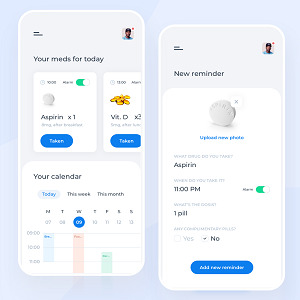
Calendars that may be personalized in this way can be used to plan out mental health practices and daily routines.
Mindfulness and Meditation
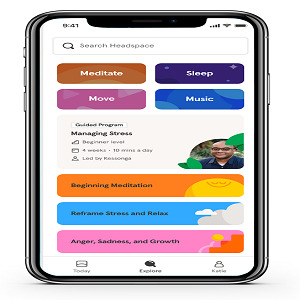
Provide several different types of guided meditation and mindfulness practices to help with stress reduction and cognitive focus.
Data Security and Privacy

Protect sensitive user information by adhering to rules like HIPAA that emphasize data privacy and security.
If you’re building a Mental Health App to help people improve their mental health, consider including these functions.
Monetization Strategies for Mental Health App Development
Developing a successful business plan is crucial before starting work on a Mental Health App.
You can choose from the following well-liked revenue models:
Freemium Model
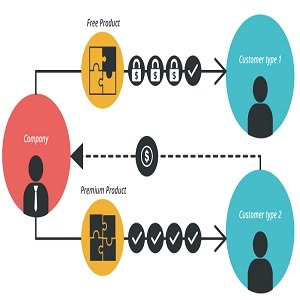
Offering a combination of free and paid tiers is a popular strategy. Users can use the Mental Health App for free up to a certain point but can then make in-app purchases to access premium features and content. One variant is to provide the entire app functionality for free for a limited time, after which users must pay to keep access to the premium features.
Subscription Model

The idea behind subscriptions is that users would pay regularly to gain access to ever-evolving media like how-to guides, videos, and podcasts. Monthly, quarterly, and annual subscriptions are the most common payment intervals offered by apps. Plans can be tailored to meet the needs of individual customers. Users who only use the apps that help with mental health sometimes but want to save money in the long run might consider a subscription.
Paid Apps

In contrast to the freemium model, the users of premium applications must pay a fee before using the app’s functionality. The best Mobile App Development Company may sweeten the deal by including exclusive extras or updates with the paid version.
How Much Does It Cost to Develop a Mental Health App?
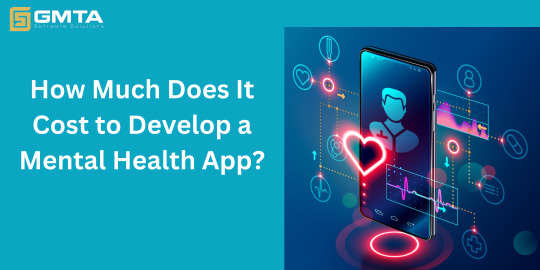
Several factors, such as the app’s complexity, functionality, platform (iOS, Android, or both), and development location, can greatly affect the cost of creating a mental health app. However, a ballpark figure is as follows:
· Basic Mental Health App:

The going rate for a basic Mental Health App with features like mood tracking, journaling, and access to self-help materials is around $12,000.
· Mid-level Mental Health App:
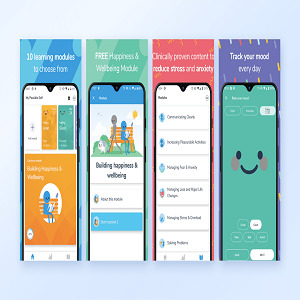
$15,000-$20,000 for an app with advanced capabilities, including encrypted therapist communication, custom treatment plans, and automated reminders.
· Advanced Mental Health App:
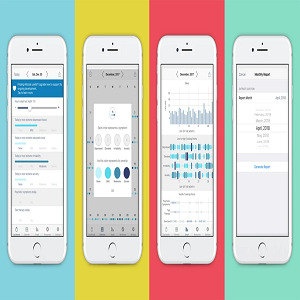
Costs can reach up to $50,000 or more for sophisticated mental health software with features like teletherapy, artificial intelligence-driven mood analysis, and wearables integration.
Remember that there are expenditures beyond original creation, such as maintenance, upgrades, and server space. The complexity of the app’s design, as well as the development team’s (in-house or outsourced) decision to create it, can also affect the final price tag.
Getting an accurate price suited to your app’s requirements and goals requires consulting with expert on demand App Development services.
In this age of constant connectivity, Mental Health App can be downloaded and used whenever needed. They enable people to reach out for assistance in times of crisis without feeling ashamed or embarrassed.
These programs provide a secure environment to share difficulties and find ways to cope with them. Hiring a Mobile Application Development Services might help you take your idea from concept to marketable product.
1 note
·
View note
Text
Transform Your Well-being with Advanced Digital Health Wearables
In the rapidly evolving healthcare landscape, digital technologies transform how we monitor, manage, and understand our well-being. Among these innovations, Health wearable devices have emerged as game-changers, empowering individuals to take charge of their health while providing invaluable data for medical research. Brainstem.health, a pioneering platform, has harnessed the potential of these wearables to collect medical-grade data, offer insightful analytics, and even enable users to monetize their health information.
Health Wearable Devices: A New Era in Healthcare
From fitness trackers to smartwatches, health wearable devices have transcended their initial role as trendy gadgets. Our devices have become integral to modern healthcare, allowing individuals to monitor vital signs, physical activity, sleep patterns, and more in real time. We have capitalized on the ubiquity of wearables, recognizing their capacity to provide a wealth of data that can significantly impact the healthcare landscape.

The Brainstem Approach: Leveraging Wearables for Medical-Grade Data
We stand at the forefront of the healthcare revolution, utilizing wearable devices to gather data that goes beyond mere anecdotal insights. We tap into a continuous stream of medical-grade information by integrating it with various health wearables. This data encompasses intricate details about heart rate, oxygen levels, movement patterns, and stress indicators. This granularity level empowers individuals and healthcare professionals with accurate and personalized health information.
Unleashing the Power of Analytics
The actual value of health data lies not just in its collection but also in the actionable insights it can provide. We don't stop at amassing data; it transforms raw information into meaningful analytics. These analyses offer users a comprehensive view of their health trends over time. Moreover, healthcare providers can leverage these insights to deliver personalized treatment plans, disease management strategies, and preventive interventions.

Monetizing Health Data: Empowering Individuals
A groundbreaking aspect of Brainstem is our unique proposition allowing users to monetize their health data. This innovative concept recognizes that individuals are the rightful owners of their health information. By giving people a venue to communicate with researchers about their anonymized data, we promote medical breakthroughs and empower users to contribute to advancements in healthcare while benefiting financially.
Conclusion
Brainstem.health is a trailblazer in the healthcare digital wearable arena, harnessing the power of health wearable devices to transform how we approach well-being. Through its sophisticated integration of medical-grade data collection, insightful analytics, and a user-centric approach to data ownership, we have redefined the landscape of healthcare participation. As the potential of health data from wearables continues to be unlocked, it's not just individual lives being transformed but the future of healthcare as a whole.
To know more about visit here
I
1 note
·
View note
Text


It’s not about you. I’m not even sure if I can wish a happy holiday, I’m too perturbed by the parallels I found in the memoir I finished recently. For me that writer was defined by her stories about her life as a farm labourer in England during the war. I didn’t realise that she was already in her fifties when that part of her life happened. Before she had grown up the spoiled daughter of a German Painter dad and a Russian exile mother, and she had moved in all kinds of artistic circles of the time. As a child she met Renoir, Rodin and even played in Monet’s garden. But as an adult she experienced first hand that time in my country’s history that the newly emboldened right now wants to minimise into “only 12 dark years”. She goes into a lot of harrowing details and descriptions of friends and relatives that got sucked in or turned themselves towards the brown shirted regime, and even I sometimes forget that the nazis depicted in Indiana Jones movies were not exactly just caricatures. It was unashamedly horrendous! I never believed I’d see a return to those inhumane ideas in my lifetime and I read the book with mounting horror. The only vindication I feel is that I could now refute the elderly lady (God rest her) that told me once that “Germans have murderousness in their very genes”: No, we’re all genetically capable of committing indescribable horrors. My ancestry has no monopoly on that. But I weep as I’m not even sure if it is safe to congratulate a young friend online to her wedding in your country, cause I don’t know what repercussions it might have for her as an undocumented foreigner, with all the compromised online data protection. I know, to protect our mental health we have to shield ourselves from too many news reels, but on today’s day I want to acknowledge the historic abyss that we’re all standing on the edge of. All our rights are being questioned, no-one is safe. Never let it be said we didn’t know what is coming down the line😞 Hugs and
Love from Your Librarian XOXO 🧡❣️
0 notes
Text
Unlocking the Potential of OTT APP Development with ideyaLabs in 2025

The demand for OTT (Over-the-Top) applications continues to surge in 2025. Businesses seek innovative solutions to deliver content directly to consumers. ideyaLabs specializes in OTT app development, providing tailored services that meet the unique needs of various industries. This blog post explores the comprehensive offerings of ideyaLabs in the realm of OTT app development, highlighting the benefits and features that set our services apart.
The Importance of OTT APP Development in Today's Market
OTT app development plays a crucial role in the digital landscape. Consumers prefer on-demand content, leading to a shift from traditional broadcasting to streaming services. Businesses must adapt to this trend to remain competitive. ideyaLabs offers a range of services that empower companies to create engaging and user-friendly OTT platforms.
Consumer Preferences: Viewers demand flexibility and convenience in accessing content.
Market Growth: The OTT market continues to expand, presenting opportunities for businesses.
Competitive Edge: Companies that invest in OTT app development gain a significant advantage.
Comprehensive Services Offered by ideyaLabs
At ideyaLabs, we provide a full suite of OTT app development services. Our approach ensures that every project aligns with client goals and industry standards.
Custom OTT Platform Development: We create tailored solutions that reflect your brand identity.
Video Streaming App Development: Our applications deliver seamless streaming experiences.
OTT Content Management Systems (CMS): We streamline content delivery and management.
Cross-Platform OTT App Development: Our services ensure consistent user experiences across devices.
OTT Monetization Solutions: We help businesses maximize revenue through various monetization strategies.
The Systematic Process of OTT APP Development at ideyaLabs
Our structured approach to OTT app development guarantees high-quality results. We follow a meticulous process from concept to launch.
Discovery and Planning: We conduct market research to understand user preferences and define project goals.
Design and Prototyping: Our team develops wireframes and prototypes to visualize app navigation.
Development and Integration: We build scalable backend infrastructure and integrate necessary APIs.
Testing and Quality Assurance: Comprehensive testing ensures all features function as intended.
Deployment and Launch: We prepare for app deployment and monitor performance post-launch.
Support and Maintenance: Ongoing support ensures optimal performance and user satisfaction.
Key Benefits of Partnering with ideyaLabs for OTT APP Development
Choosing ideyaLabs for OTT app development offers numerous advantages. Our expertise and commitment to quality set us apart in the industry.
Tailored Solutions: We customize platforms to meet specific business needs.
Scalability: Our solutions grow with your user base and content demands.
Enhanced User Engagement: We design intuitive interfaces that captivate viewers.
Advanced Analytics: Our platforms provide insights for data-driven decision-making.
Monetization Opportunities: We offer diverse revenue models to maximize profitability.
Industries Benefiting from OTT APP Development
OTT app development serves various industries, each with unique requirements. ideyaLabs caters to a wide range of sectors.
Media & Entertainment: On-demand access to movies and shows enhances viewer experience.
Healthcare: Telemedicine apps facilitate virtual consultations and health education.
Retail & eCommerce: OTT solutions boost customer engagement through product demos.
Education: Remote learning apps provide access to educational content anytime.
Travel & Hospitality: OTT apps transform travel planning with virtual tours and booking services.
Innovative Technologies in OTT APP Development
At ideyaLabs, we leverage cutting-edge technologies to enhance OTT app development. Our tech stack ensures seamless streaming and robust performance.
Frontend Technologies: We utilize modern frameworks for responsive design.
Backend Infrastructure: Our scalable solutions support high traffic and content management.
Cloud Services: We implement cloud solutions for efficient content delivery.
Security Measures: Our apps include robust security protocols to protect user data.
Success Stories of OTT APP Development by ideyaLabs
Our portfolio showcases successful OTT app development projects that highlight our expertise.
Regional Entertainment Platform: We built a million-user OTT platform, enhancing user engagement and reducing operational costs.
Sports Streaming Solution: Our high-performance OTT platform enabled real-time streaming of multiple live events, improving user experience.
Conclusion: The Future of OTT APP Development with ideyaLabs
The future of OTT app development looks promising. ideyaLabs remains committed to delivering innovative solutions that meet the evolving needs of businesses. Our expertise in creating high-performance OTT platforms positions us as a leader in the industry. Companies looking to enhance their digital presence should consider partnering with ideyaLabs for their OTT app development needs.
Invest in the future of entertainment with ideyaLabs and unlock the full potential of your OTT platform.
0 notes